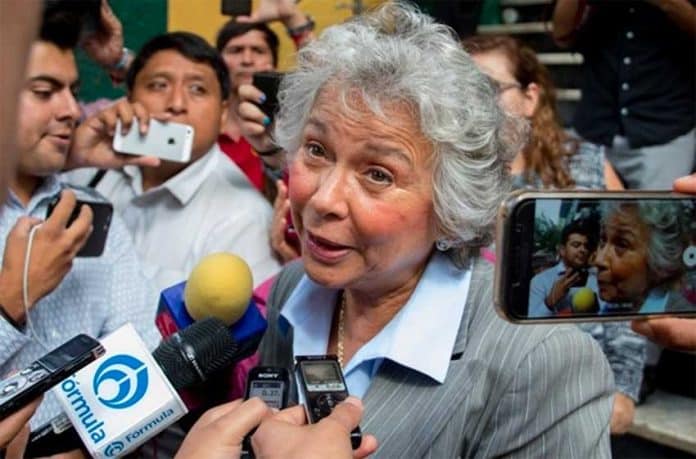Mexico’s next interior secretary says president-elect Andrés Manuel López Obrador has given her a “blank check” to explore the possibility of legalizing drugs as well as any other measures that could help restore peace to the country.
Olga Sánchez Cordero, a former Supreme Court judge, said López Obrador is familiar with her writings and public comments about drug legalization and told her at a meeting Saturday that she had “a blank check, whatever is necessary to pacify this country, let’s open the debate.”
Speaking at a university seminar about violence and peace, Sánchez said that over the past 10 years successive federal governments have been incapable of putting an end to violence and have claimed that the insecurity problem isn’t as bad as it really is.
“We’re not going to pretend that nothing’s happening in Mexico . . . Mexico is immersed in violence. We’re a country with tens of thousands of missing people. We have to transcend the legal truth, go further . . .” she said.
Sánchez said it’s crucial to start talking about a “transitional justice system” that would include a reduction in prison sentences for criminals that shed light on unsolved cases, reparations for victims of crime, an amnesty program and the establishment of truth and investigative commissions.
The last proposal is consistent with a federal court order last month that a truth and justice commission be created to undertake a new investigation into the case of the 43 students who disappeared in Guerrero in 2014 after it ruled that the original probe was flawed.
López Obrador, who won the July 1 presidential election in a landslide, was heavily criticized for his amnesty proposal during the presidential campaign, especially by his main rivals who charged that it was evidence that he would be soft on crime.
But the prospective interior secretary said yesterday that those who reject the president-elect’s proposals to combat violence deny that there is a problem in the first place.
“Those who question the possibility of starting to talk about another way of combating violence, not with more violence, question whether we are in a conflict and whether we need new institutions and systems to confront this reality,” Sánchez said.
Earlier this month, she and prospective public security secretary Alfonso Durazo told a press conference that women, children and youth forcibly recruited by organized crime would be the main focus of an amnesty law.
The López Obrador-led administration also plans to gradually withdraw the military from public security duties on the nation’s streets and instead focus on improving training, pay and conditions for the nation’s police.
The military-based war on drugs was introduced by former president Felipe Calderón in 2006 and continued under the current administration led by President Enrique Peña Nieto.
However, despite the increased military presence, homicide rates have continued to rise, leading many analysts to conclude that the strategy has failed.
More than 200,000 homicides have been recorded since the war on drugs started and 2017 was the most violent year in Mexico in at least two decades.
“A transitional justice system for Mexico is possible and urgent, not just for the victims of the violence but for all of Mexican society,” Sánchez said.
Source: Milenio (sp), El Financiero (sp)
